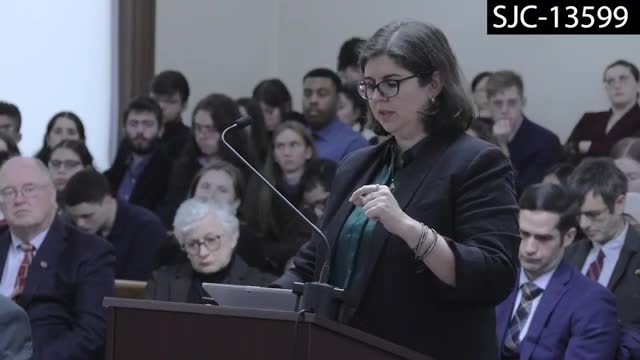Defendant's Denial Sparks Controversy in Beach Investigation
November 01, 2024 | Judicial - Supreme Court, Judicial, Massachusetts
This article was created by AI summarizing key points discussed. AI makes mistakes, so for full details and context, please refer to the video of the full meeting. Please report any errors so we can fix them. Report an error »

In a recent court proceeding, the defense presented a case involving a defendant accused of misleading police during an investigation related to an incident at the beach. The defendant denied being at the beach or the ocean, despite police knowledge that an individual matching his description had been present and allegedly threw something into the water.
During the interrogation, the defendant admitted ownership of a knife shown to him but maintained that he had no recollection of being near the water. His repeated assertions of being \"sauced up\" and his inability to remember events from that night raised questions about the credibility of his statements. The prosecution argued that his denials were intended to mislead law enforcement, potentially obstructing the investigation.
Legal discussions centered on the definition of misleading statements, referencing a specific statute that outlines the criteria for willfully impeding an investigation. The prosecution highlighted that the defendant's clear denials, particularly his unequivocal \"no\" when asked about being at the ocean, could be classified as knowingly making false statements.
As the case unfolds, the court will need to determine whether the defendant's actions constitute a deliberate attempt to mislead police, which could have significant implications for the charges he faces.
During the interrogation, the defendant admitted ownership of a knife shown to him but maintained that he had no recollection of being near the water. His repeated assertions of being \"sauced up\" and his inability to remember events from that night raised questions about the credibility of his statements. The prosecution argued that his denials were intended to mislead law enforcement, potentially obstructing the investigation.
Legal discussions centered on the definition of misleading statements, referencing a specific statute that outlines the criteria for willfully impeding an investigation. The prosecution highlighted that the defendant's clear denials, particularly his unequivocal \"no\" when asked about being at the ocean, could be classified as knowingly making false statements.
As the case unfolds, the court will need to determine whether the defendant's actions constitute a deliberate attempt to mislead police, which could have significant implications for the charges he faces.
Don't Miss a Word: See the Full Meeting!
Go beyond summaries. Unlock every video, transcript, and key insight with a Founder Membership.
✓
Get instant access to full meeting videos
✓
Search and clip any phrase from complete transcripts
✓
Receive AI-powered summaries & custom alerts
✓
Enjoy lifetime, unrestricted access to government data
30-day money-back guarantee

